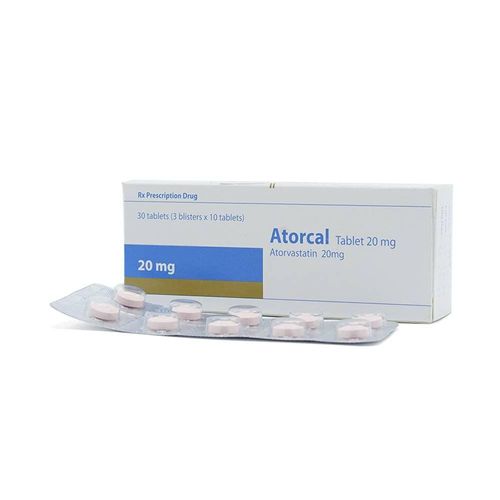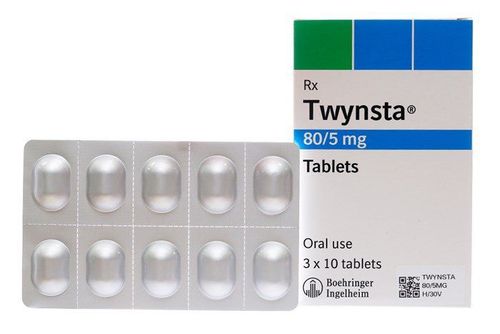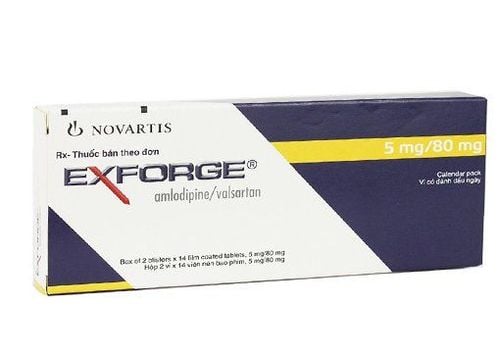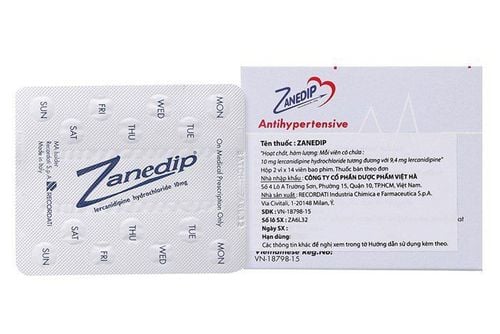This is an automatically translated article.
Beatil medicine 4mg / 10mg is made in the form of tablets, with the main ingredients being Perindopril tert-butylamine and Amlodipine. It is used in the treatment of essential hypertension and stable coronary artery disease.
1. Uses of the drug Betil 4mg/10mg
What is Beatil drug? Ingredients: Perindopril 4mg and Amlodipine 10mg. Perindopril inhibits the enzyme that catalyzes the conversion of angiotensin I to angiotensin II, effectively lowering blood pressure. Amlodipine is a calcium channel blocker of the dihydropyridine group, which inhibits the influx of calcium ions into the myocardium and vascular smooth muscle. Amlodipine is a direct vascular smooth muscle relaxant, which helps fight hypertension and relieves angina pectoris.
Indications for use of Beatil 4mg/10mg: As an alternative therapy in the treatment of essential hypertension and stable coronary artery disease in patients already controlled with perindopril and Amlodipine at equivalent doses.
Contraindications to the use of Beatil 4mg/10mg:
People who are hypersensitive or allergic to the ingredients of the drug, other ACE inhibitors or dihydropyridine group drugs; People with a history of angioedema related to previous treatment with ACE inhibitors; Patients with idiopathic or hereditary angioedema; Pregnant women in the second or third trimester of pregnancy; Concomitant use with aliskiren-containing drugs in patients with diabetes or renal failure (glomerular filtration rate less than 60ml/min/1.73m2); People in shock, including cardiogenic shock\; Patients with left ventricular outflow obstruction (eg, severe aortic stenosis); Patients with heart failure are hemodynamically unstable after acute myocardial infarction.
2. How to use and dose of Betil 4mg/10mg
Usage: Orally. Patients should take the drug in the morning, before meals.
Dosage:
Usual dose: 1 tablet/day. Fixed-dose combination preparations are not suitable for initial treatment. If dosage changes are required, the individual components should be changed using single-ingredient preparations; Patients with impaired renal function and the elderly: Because the elimination of perindoprilat is reduced in patients with renal insufficiency and the elderly, creatinine and potassium levels should be regularly monitored. Beatil drug can be used for patients with creatinine clearance ClCl above 60ml/min, not suitable for patients with ClCr less than 60ml/min. For this group of patients, the dose should be changed, the dose should be changed with preparations with single ingredients. Changes in Amlodipine plasma concentrations were not related to the degree of renal impairment; Patients with impaired liver function: Dosage has not been established, caution should be exercised in this group of subjects; Children: Beatil 4mg/10mg should not be used in children and adolescents. Overdose:
Related to Perindopril: Symptoms include hypotension, electrolyte disturbances, circulatory shock, shortness of breath, renal failure, tachycardia, bradycardia, anxiety, cough and dizziness. Treatment of overdose is intravenous infusion of 0.9% sodium chloride solution. If the patient is hypotensive, the patient should be placed in the shock position. Alternatively, an intravenous infusion of angiotensin lI, intravenous catecholamines, may be considered for the patient. Perindopril may be removed by hemodialysis from the circulation. In patients with refractory bradycardia, a pacemaker should be used. In addition, the patient's vital signs, serum creatinine and electrolyte levels should be continuously monitored; Related to Amlodipine: If large amounts of Amlodipine are used, it may lead to excessive peripheral vasodilation, causing reflex tachycardia. There have been cases of systemic hypotension, shock and death. The treatment of hypotension due to Amlodipine overdose requires intensive cardiovascular support (including monitoring of cardiac and respiratory function, elevation of extremities, attention to volume of circulating fluid and urine). Vasopressors can be used to restore vascular tone and raise blood pressure if possible. Alternatively, intravenous calcium gluconate may be administered to reverse the calcium channel blockade. In some cases, it is possible to rinse the stomach, use activated charcoal,... Missed dose: If you forget to take a dose of Betil 4mg/10mg, you should take it as soon as possible. If it is almost time for your next dose, skip the missed dose and take your next dose at the scheduled time.
3. Side effects of the drug Betil 4mg/10mg
When using Beatil 4mg/10mg drug, patients may experience side effects such as:
Blood and lymphatic system disorders: Eosinophilia, leukopenia, thrombocytopenia, and total leukopenia , agranulocytosis, decreased hemoglobin and decreased hematocrit, leukopenia/neutropenia, hemolytic anemia in patients with congenital G6PD deficiency; Immune system disorders: Allergic reactions; Nutritional and metabolic disorders: Hypoglycemia, hyperkalemia (reversible with drug discontinuation), hyponatremia, hyperglycemia; Psychiatric disorders: Depression, mood swings (including anxiety), insomnia, sleep disturbances, mood disturbances, confusion; Nervous System Disorders: Somnolence, headache, dizziness, paresthesia, malaise, tremor, taste disturbances, decreased tactile sensations, syncope, hypertonia, peripheral neuropathy, extrapyramidal disorders ; Eye disorders: Visual disturbances (including diplopia); Ear and labyrinth disorders: Tinnitus; Cardiac disorders: Palpitations, arrhythmias (including tachycardia, bradycardia and atrial fibrillation), myocardial infarction, angina; Vascular Disorders: Skin flushing, hypotension and related events, vasculitis, stroke (may occur secondary to excessive hypotension in high-risk patients); Respiratory, mediastinal and thoracic disorders: Shortness of breath, cough, rhinitis, bronchospasm, pneumonia; Digestive disorders: Abdominal pain, dyspepsia, nausea, change in bowel habits (diarrhea and constipation), taste disturbances, vomiting, dry mouth, pancreatitis, gastritis, gingival hyperplasia; Hepatobiliary disorders: Hepatitis, jaundice, increased liver enzymes, biliary obstruction; Skin and Subcutaneous Tissue Disorders: Skin itching, rash, alopecia, purpura, exanthema, urticaria, skin discoloration, increased sweating, angioedema of the face, lips, mucous membranes, tongue, mouth, larynx, extremities, photosensitivity, vesicular disease, erythema multiforme, Stevens-Johnson syndrome, exfoliative dermatitis, Quincke's edema; Musculoskeletal and Connective Tissue Disorders: Cramps, ankle swelling, muscle pain, back pain, arthralgia; Renal and urinary disorders: Urinary disorders, increased frequency of urination, nocturia, impaired renal function; Disorders of the breast and genitourinary system: Impotence , gynecomastia in men, erectile dysfunction; Systemic disorders and administration site: Edema, fatigue, asthenia, chest pain, fever, malaise; Laboratory parameters: Weight loss, weight gain, increased blood creatinine, increased blood urea, increased liver enzymes, increased blood bilirubin; Injuries and related complications: Fall. When experiencing side effects of Beatil 4mg/10mg, the patient should stop taking the drug and immediately notify the doctor or go to the nearest hospital for timely examination and treatment.
4. Be careful when using Betil 4mg/10mg
All of the following precautions apply to the Betil dose combination preparation. Concomitant use of Beatil with potassium-sparing diuretics, lithium, potassium supplements or dantrolen is not recommended.
Some precautions when using Beatil 4mg/10mg include:
4.1 Relating to Perindopril If unstable angina occurs in the first month of Perindopril use, the benefit/risk assessment should be made before continuing. continuing treatment; ACE inhibitors can cause low blood pressure. This condition is common in volume-depleted patients such as those on diuretics, dialysis, vomiting, diarrhea, salt-restricted diets, or patients with severe renin-dependent hypertension. There have been cases of hypotension in patients with severe heart failure presenting with hyponatremia, impaired renal function or requiring high doses of loop diuretics. In patients at increased risk of hypotension, close monitoring is recommended at the start of treatment and when adjusting the dose. The drug should be considered in patients with ischemic heart disease or cerebrovascular disease because excessive hypotension can lead to myocardial infarction or cerebrovascular accident; Use caution when using Perindopril in patients with mitral stenosis, aortic stenosis, hypertrophic cardiomyopathy; Patients with renal impairment with creatinine clearance less than 60 ml/min need to adjust the starting dose of Perindopril according to creatinine clearance. The dose should then be adjusted according to the therapeutic response. Periodic monitoring of serum potassium and creatinine levels is recommended in this group of patients; Diuretics should be discontinued and renal function monitored when initiating therapy with perindopril; There have been cases of anaphylactic reactions in hemodialysis patients concomitantly with perindopril. Patients should consider the use of antihypertensive drugs; There is no experience with the use of Perindopril in recent kidney transplant patients; Patients taking Perindopril may experience angioedema of the lips, tongue, mucous membranes, glottis, larynx, or extremities. In this case, the drug should be discontinued and appropriate control measures taken; Patients may experience a life-threatening anaphylactic reaction if perindopril is used during LDL removal with dextran sulphate. Therefore, this reaction should be avoided by temporarily discontinuing perindopril before each LDL-cleaving episode; Patients receiving Perindopril while on anti-sensitization therapy may experience an anaphylactic reaction. This reaction should be avoided by temporarily discontinuing Perindopril; Perindopril may be associated with cholestatic jaundice, which then progresses to hepatic necrosis, which can be fatal. Patients experiencing symptoms of jaundice or elevated liver enzymes should discontinue the drug and take appropriate medical supervision; An increased risk of neutropenia, thrombocytopenia, agranulocytosis and anemia has occurred in patients receiving Perindopril. The drug should be used with caution in patients with collagen vascular disease, taking immunosuppressive regimens or receiving treatment with allopurinol, procainamide (especially if the patient has renal impairment). The risk of serious infection has been present in some patients. If using the drug, should periodically check the white blood cell, instruct the patient to notify the doctor when detecting signs of infection such as fever, sore throat; Using the drug Perindopril can cause cough, no sputum, persistent, self-regressing when stopping the drug; Beatil 4mg/10mg should be discontinued 1 day before surgery. If drug-induced hypotension is present, it should be managed by adding volume to the body; Hyperkalemia has been reported in some patients receiving Perindopril. Risk factors include renal failure, over 70 years of age, diabetes, dehydration, metabolic acidosis, acute decompensated heart disease, use of potassium-sparing diuretics, potassium supplements, and use of potentially dangerous medications. muscle hyperkalemia,... Hyperkalemia causes serious cardiac arrhythmias and can lead to death. Therefore, caution should be exercised, monitoring serum potassium levels if the use of Perindopril is combined with the above drugs and preparations; Diabetics being treated with oral antidiabetic agents or insulin require tight glycemic control during the first month of treatment with perindopril; Concomitant use of Perindopril with lithium, potassium-sparing drugs, potassium supplements, potassium-containing salts is not recommended; The concomitant use of Perindopril for dual blockade of the RAA system is not recommended. If treatment is necessary, the patient's blood pressure, electrolytes and renal function should be closely monitored; 4.2 Concerning Amlodipine Safety and efficacy of Amlodipine have not been established in the treatment of hypertensive crises; Amlodipine should be used with caution in patients with heart failure because of an increased risk of cardiovascular events and death; The half-life of Amlodipine is prolonged, and the AUC is higher in patients with hepatic impairment. There is no recommended dose of Amlodipine for this population, so it is necessary to start with the lowest dose in the recommended dose range, with caution when initiating and increasing the dose. Dosage should be adjusted slowly, with close monitoring in patients with severe hepatic impairment. Caution should be exercised when increasing the dose of Amlodipine in elderly patients; Amlodipine can be used in patients with renal impairment at the usual dose. 4.3 Other notes There have not been studies on the effects of Beatil 4mg/10mg on drivers, operating machines, but this subject needs to be cautious because sometimes dizziness, fatigue, headache, sadness may occur. vomiting, hypotension,...; The use of Beatil 4mg/10mg is not recommended in the first trimester of pregnancy, and is contraindicated in the second and third trimesters of pregnancy. If pregnant or planning to become pregnant, the patient should switch to an alternative method as soon as possible; The use of Betil 4mg/10mg is not recommended during lactation. A decision should be made between discontinuing breastfeeding or discontinuing Beatil after assessing the need for the mother's use of the drug.
5. Beatil drug interactions 4mg/10mg
Drug interactions Beatil 4mg/10mg is evaluated based on 2 main ingredients of the drug. Specifically:
5.1 Concerning Perindopril Perindopril may increase the risk of angioedema if used concurrently with racecadotril (an anti-diarrheal drug); Perindopril when used concurrently with mTOR inhibitors (sirolimus, everolimus, temsirolimus) may increase the risk of angioedema; Co-administration of Perindopril with some of the following drugs may cause hyperkalemia: Aliskiren, potassium salts, heparin, immunosuppressive drugs such as cyclosporin, tacrolimus, trimethoprim or potassium-sparing diuretics,...; Perindopril and Estramustine should not be used concurrently because of the increased risk of angioedema; Do not use Perindopril with Lithium concurrently. If a combination is required, careful control of serum lithium concentrations is recommended; Use caution when using Perindopril with antidiabetic drugs because it can increase the hypoglycemic effect, there is a risk of hypoglycaemia (common in the first week of combination therapy and common in patients with renal failure); Concomitant use of Perindopril with Baclofen increases the antihypertensive effect. Therefore, it is necessary to monitor blood pressure, adjust the dose of antihypertensive drugs if necessary; Concomitant use of Perindopril with non-potassium-sparing diuretics (particularly those with volume depletion or salt depletion) may result in an excessive hypotensive reaction. The risk of hypotension should be reduced by discontinuing diuretics, increasing fluid volume, and adding salt prior to treatment with Perindopril. Renal function should be monitored during the first few weeks of treatment with Perindopril; Concomitant use of Perindopril with potassium-sparing diuretics such as eplerenon, spironolactone may appear to increase the risk of hyperkalemia, which can easily lead to renal failure and death. Therefore, it is necessary to closely monitor serum potassium and renal creatinine in patients with a frequency of once a week and monthly; Concomitant use of Perindopril with non-steroidal anti-inflammatory drugs may reduce the effectiveness of the treatment of hypertension, causing acute renal failure and hyperkalemia (especially in patients with pre-existing renal impairment). The combination of these two groups of drugs should be cautious, especially in the elderly. Patients should be rehydrated, renal function should be monitored during treatment and periodically thereafter; Concomitant use of antihypertensives and vasodilators with Perindopril may increase the hypotensive effect of Perindopril; Concomitant use of Perindopril with gliptin drugs (linagliptin, saxagliptin, sitagliptin, vildagliptin) may increase the risk of angioedema; Concomitant use of Perindopril with anesthetics, tricyclic antidepressants and antipsychotics may cause further reductions in blood pressure; Sympathomimetic agents may reduce the antihypertensive effect of Perindopril; A nitrite-like reaction (manifesting nausea, vomiting, flushing and hypotension) may occur in patients treated with parenteral gold-containing therapy (sodium aurothiomalat) concurrently with Perindopril. 5.2 In relation to Amlodipine Concomitant use of Amlodipine with moderate or strong CYP3A4 inhibitors (azole antifungals, protease inhibitors, clarithromycin, diltiazem, verapamil) may increase the risk of hypotension. The clinical condition of the patient should be monitored, dose adjustment may be necessary; Concomitant use of Amlodipine with CYP3A4 inducers may reduce Amlodipine plasma concentrations, so the patient should be cautious; Do not take Amlodipine with grapefruit or grapefruit juice because it may increase the antihypertensive effect; Avoid the combination of Amlodipine with patients susceptible to malignant hyperthermia, in the treatment of malignant hyperthermia to avoid the risk of hyperkalemia; Concomitant use of Amlodipine with antihypertensive drugs will increase the antihypertensive effect; Concomitant use of Amlodipine with Tacrolimus may increase blood levels of Tacrolimus. To avoid toxicity of Tacrolimus, when using Amlodipine for patients being treated with Tacrolimus should monitor Tacrolimus blood levels, adjust Tacrolimus dose accordingly; Consider monitoring cyclosporin levels in kidney transplant patients receiving amlodipine, reducing cyclosporin dose as needed; Co-administration of multiple doses of 10 mg Amlodipine and 80 mg simvastatin resulted in a 77% increase in simvastatin exposure compared with simvastatin alone. The maximum dose of simvastatin in patients receiving Amlodipine is 20 mg/day; Concomitant administration of Amlodipine with Baclofen increases the antihypertensive effect. Therefore, it is necessary to monitor blood pressure, kidney function, adjust the dose of antihypertensive drugs when necessary; Caution should be exercised when Amlodipine is used concomitantly with nitroglycerin, other nitrates or other vasodilators because of possible further reduction in blood pressure; Concomitant use of Amlodipine with Corticosteroids, tetracosactide reduces the antihypertensive effect; Concomitant use of Amlodipine with Alpha-blocker (prazosin, doxazosin, tamsulosin, alfuzosin, terazosin) increases the antihypertensive effect, increases the risk of orthostatic hypotension; Concomitant administration of Amlodipine with Amifostin increases the antihypertensive effect of Amlodipine; Concomitant use of Amlodipine with anesthetics, tricyclic antidepressants, antipsychotics will increase the antihypertensive effect, increase the risk of orthostatic hypotension. When using the drug Beatil 4mg/10mg, patients should strictly follow the instructions of their doctor to ensure safety and avoid the risk of unpredictable side effects.
Please dial HOTLINE for more information or register for an appointment HERE. Download MyVinmec app to make appointments faster and to manage your bookings easily.













